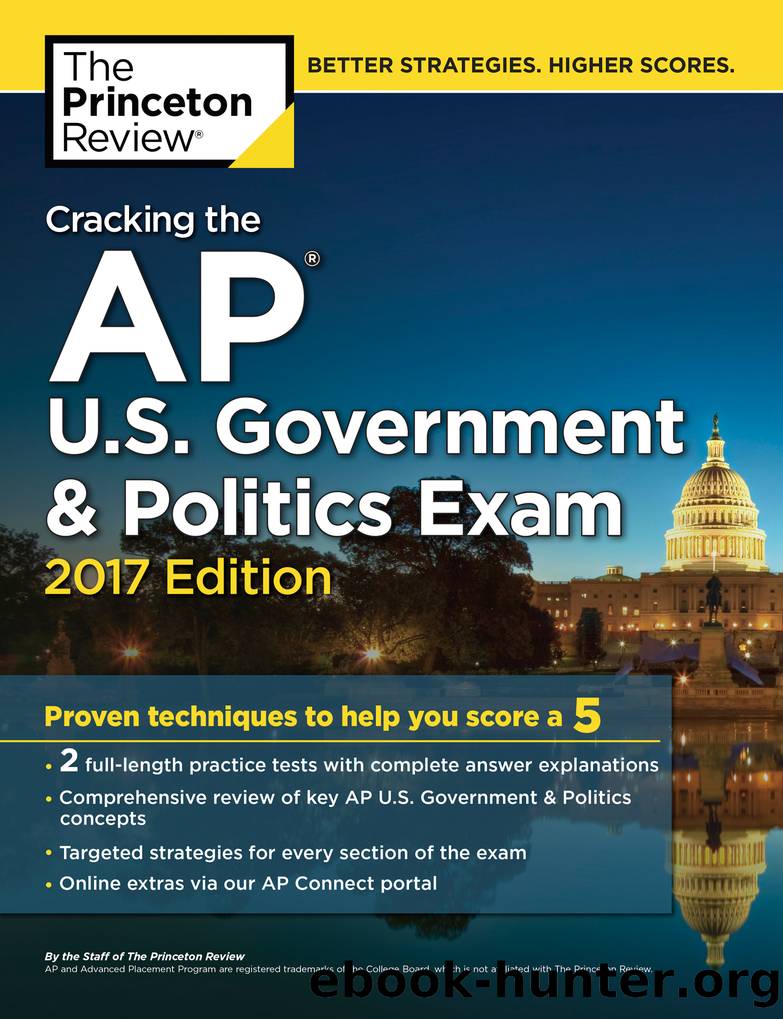Cracking the AP U.S. Government & Politics Exam, 2017 Edition by Princeton Review

Author:Princeton Review [Review, The Princeton]
Language: eng
Format: epub
Publisher: Random House Children's Books
Published: 2016-11-08T00:00:00+00:00
THE JUDICIARY AND THE LAW
Concepts
⢠What circumstances are required for a case to be brought before the Supreme Court?
⢠How do politics enter into Supreme Court decisions?
⢠Why can it be said that all judicial decisions are activist?
⢠Why can it be said that a presidentâs strongest legacy is found in the judiciary?
⢠What control does Congress have over the judiciary?
American Legal Principles
Although the United States plays host to the interlocking systems of state and federal law, a few underlying principles make up the foundation of our legal system. They are equal justice under the law, due process of law, the adversarial system, and presumption of innocence.
All who appear in court in the United States must be treated as equals. The founders were very concerned that the new nation avoid the hierarchical legal systems that plagued many other nations and, as a result, enshrined many amendments in the Constitution that establish equal justice under the law. For example, whenever jurors hear a criminal case, they are instructed not to privilege the testimony of a police officer over that of a defendant.
Due process can be divided into two types: substantive due process and procedural due process. Substantive due process law deals with the question of whether laws are fair. Fairness is determined by looking at the Constitution, specifically the Bill of Rights and the Fourteenth Amendment. A law that made it illegal for people with blue eyes to ride motorcycles would constitute a violation of substantive due process. Procedural due process law is concerned with the question of whether laws are fairly applied. This might seem less important than substantive due process, but procedural issues are actually at the heart of our legal system. If suspects in certain types of crimes were held for ten years before they ever had a trial, this would be a violation of procedural due process, because the law guarantees everyone a speedy trial. Even if a nation has laws that are fair and just, if they are not applied fairly, they are meaningless.
Strange as it may seem to those of us raised in the United States, many nations do not require both sides of legal cases to be represented by advocates. This inquisitorial system, as it is known, is alien to the United States, where we use the adversarial system. As you can probably guess from the name, this principle is based on the premise that the best way to work out questions of fact is to have two sidesâor adversariesâdebate the burden of guilt or liability in a situation. Some critics say that this system creates too many conflictsâparticularly in areas such as family law and divorce, and recommend an increased role for mediators who seek rapprochement and can make legally binding decisions.
In his Commentaries on the Laws of England, English jurist and professor William Blackstone said, âBetter that ten guilty persons escape than that one innocent suffer,â and this number became known as the Blackstone ratio. Benjamin Franklin expanded this, writing âthat it is better [one hundred] guilty Persons should escape than that one innocent Person should suffer.
Download
This site does not store any files on its server. We only index and link to content provided by other sites. Please contact the content providers to delete copyright contents if any and email us, we'll remove relevant links or contents immediately.
Barron's AP Biology by Goldberg M.S. Deborah T(4146)
ACT Math For Dummies by Zegarelli Mark(4043)
What It Really Takes to Get Into Ivy League and Other Highly Selective Colleges by Hughes Chuck(3751)
5 Steps to a 5 AP U.S. History, 2010-2011 Edition (5 Steps to a 5 on the Advanced Placement Examinations Series) by Armstrong Stephen(3726)
McGraw-Hill's SAT 2014 Edition (Mcgraw Hill's Sat) by Black Christopher & Anestis Mark(3422)
Kick Ass in College: Highest Rated "How to Study in College" Book | 77 Ninja Study Skills Tips and Career Strategies | Motivational for College Students: A Guerrilla Guide to College Success by Fox Gunnar(3118)
Graduate Admissions Essays, Fourth Edition: Write Your Way into the Graduate School of Your Choice (Graduate Admissions Essays: Write Your Way Into the) by Asher Donald(2907)
Get into Any College by Tanabe Gen Tanabe Kelly(2727)
Easy Algebra Step-by-Step by Sandra Luna McCune(2628)
500 Must-Know AP Microeconomics/Macroeconomics Questions(2569)
The Official Guide to the TOEFL Test by ETS(2326)
Cracking the Sat French Subject Test, 2013-2014 Edition by The Princeton Review(1877)
Open the Gates to the Ivy League: A Plan B for Getting into the Top Colleges by C. W. Henderson(1838)
Barron's AP Calculus by David Bock(1823)
Law School Essays that Made a Difference by Princeton Review(1800)
Cracking the SAT Literature Subject Test, 2013-2014 Edition (College Test Preparation) by Princeton Review(1769)
Barron's SAT Math Workbook by Lawrence S. Leff(1745)
Cracking the AP Physics C Exam, 2018 Edition by Princeton Review(1720)
ASVAB AFQT For Dummies by Rod Powers(1668)
